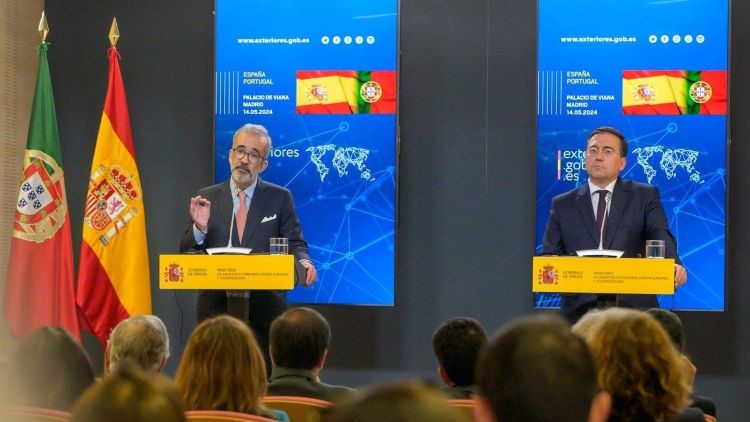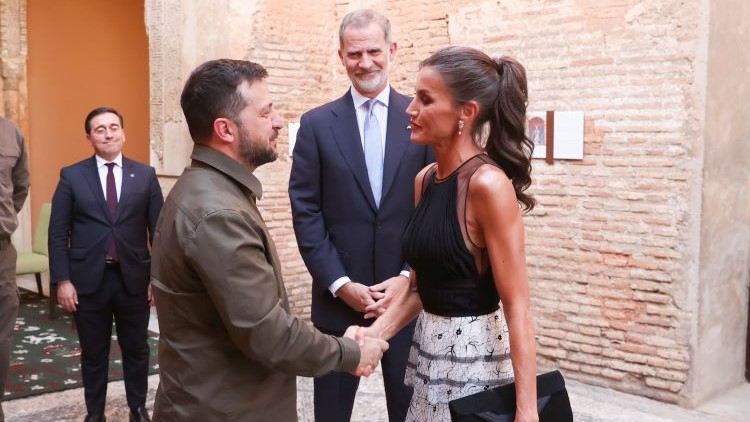Eduardo González
The Minister of Foreign Affairs, José Manuel Albares, received yesterday in Madrid his Portuguese counterpart, Paulo Rangel, with whom he committed to promoting high-speed rail connections between Lisbon and Madrid and between the Portuguese capital and Vigo and with whom he announced that the next bilateral summit will take place on October 23 in Portugal.
“We are united by deep ties, obviously geographical, but also cultural, economic and above all human,” Albares declared during the press conference after the meeting, which took place at the ministerial headquarters of the Viana Palace. For this reason, he assured, the two countries wish to “continue strengthening the already excellent bilateral relations” in issues such as “interconnections of different types, economic and investment relations, and cultural and investment relations.”
During the press conference, Albares and Rangel announced that the two Governments are already preparing the XXXV High Level Meeting which will be held on October 23 in a location in Portugal yet to be determined. The last Summit took place in March 2023 in Lanzarote, just four months after the previous one, held in Viana do Castelo. At both summits, the two countries approved several bilateral agreements directly related to the Common Cross-Border Development Strategy (adopted during the 2020 Summit) and staged their great coincidences in relation to the energy market and the application of the so-called Iberian Mechanism.
Yesterday was Paulo Rangel’s first visit to Spain since the change of Government, which went from the socialist António Costa (who maintained very good harmony with the President of the Government, Pedro Sánchez) to the conservative Luis Montenegro. Despite this, the Portuguese minister assured that “Spain is a priority for Portugal, it is not a priority of any party or any government, it is a priority of the Portuguese State” and, therefore, the relations between the two countries have been “always very good” over the last thirty or forty years regardless of “the colors”. Before this bilateral meeting, Albares and Rangel greeted each other briefly at the NATO Ministerial meeting in Brussels and at the EU Foreign Affairs Council last April.
High-speed rail
One of the most notable bilateral issues of yesterday’s meeting was the connections between the two countries, with special attention to high-speed rail connections. According to Albares, the project between Madrid and Lisbon, which was paralyzed as a result of the international financial crisis of 2008, is “a priority for Spain”, because it is necessary “to solve this anomaly that two European capitals are not yet connected by high speed”. “The sooner we solve it, the better for everyone,” he added.
For his part, Rangel assured that, for Portugal, “railway connections with Spain are fundamental” and, therefore, this issue will be one of the central axes of the next bilateral summit. Likewise, he stated that his Government grants “the same degree of priority” to both the connection between Lisbon and Madrid and the railway project between Lisbon, Porto and Vigo, which is in its early phases and is pending the Portuguese authorities putting into practice. The connection between the capital and the main city in the north is underway. The Executive of Montenegro, he assured, will “work on both at the same time to make up for lost time.”
The two ministers also addressed other projects of mutual interest, such as the bridge over the Sever river between Cedillo (Cáceres) and Nisa (Alentejo), road connections and two energy interconnection projects: the electrical connection between Fontefría, in Ourense, and Vila Fría, northern Portugal; and the connection of the Iberian Market with the rest of the European Union through France.
Palestine
During the press conference, the two ministers agreed on the main diagnosis of the situation in the Gaza Strip (support for the ceasefire, the release of the hostages, the arrival of humanitarian aid and the two-state solution), but they disagreed regarding the need to recognize the Palestinian State now.
According to Rangel, “each State has its own foreign policy” and, in this case, although Portugal is in favor of officially recognizing the Palestinian State, it is not in favor of doing so “at this moment.” According to the Portuguese minister, his country is carrying out “consultations” within the European Union to try to convince “reluctant European partners” and generate “the greatest possible consensus” in this regard.
In mid-April, Pedro Sánchez received the then newly appointed Prime Minister of Portugal, Luis Montenegro, within the framework of his round of contacts with different European leaders to attract support for his purpose of recognizing Palestine. At that meeting, the Portuguese leader made clear his support for the recognition of the State of Palestine but did not want to join the President of the Government’s intention to take this step before July and showed his preference for reaching an “international consensus” within the EU and the UN. Portugal voted on May 10 at the UN General Assembly in favor of a resolution recommending the acceptance of Palestine as a full member of the United Nations, which was supported by 142 countries, including Spain.







